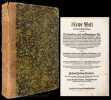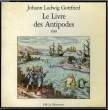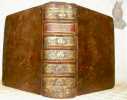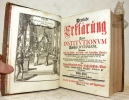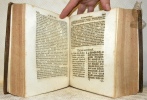101 books for « gottfried johann »Edit
-
Century
17th (4)
18th (15)
19th (31)
20th (17)
-
Countries
Belgium (2)
Denmark (28)
France (38)
Italy (1)
Switzerland (32)
-
Syndicate
ILAB (76)
NVVA (16)
SLACES (16)
SLAM (19)
Topics
- Alchemy (1)
- Alps (10)
- Alternative medicine (1)
- Architecture (1)
- Botany (2)
- Chemistry (1)
- Economics (1)
- Engraving (books about) (3)
- Engravings (1)
- Epistemology (1)
- Ethnology (1)
- Explorations (2)
- Geography (8)
- Geology (2)
- German literature (2)
- Germanic languages (10)
- Guide books (3)
- Helvética (13)
- History (11)
- Imagery (1)
- Isaac (1)
- Jacob (2)
- Judaism (judaica) (1)
- Latin (1)
- Law (2)
- Legends (2)
- Leibniz (2)
- Lessing (1)
- Literature (8)
- Mathematics (1)
- Medicine (1)
- Military arts (8)
- Mountaineering climbing (1)
- Music (1)
- Newton (1)
- North america (2)
- Pacific (1)
- Philosophy (2)
- Physics (1)
- Political economy (1)
- Portraits (1)
- Printing (1)
- Prussia (1)
- Religions & spirituality (1)
- Russia (2)
- Sciences (1)
- Switzerland (8)
- Tea (1)
- Technology (1)
- Theology (1)
- Topography (1)
- Travel (4)
- Travels & tourism (2)
- Various (1)
- Wildlife (1)
- Zoology (1)
- Zurich (2)
Le Livre des antipodes : Johann Ludwig Gottfried (La Dcouverte)
F. Maspero Broch D'occasion bon tat 01/01/1981 80 pages
"LEIBNIZ, GOTTFRIED & JOHANN BERNOULLI & JAKOB BERNOULLI & EHRENFRIED WALTHER VON TSCHIRNHAUS.
Reference : 42863
(1696)
Supplementum defectus geometria Cartesianae circa inventionem locorum. [Joh. Bernoulli] + [Two other papers]. Notatiuncula ad acta decemb. 1695. [LEIBNIZ]. - [THE BRACHISTOCHRONE PROBLEM]
Leipzig, Grosse & Gleditsch, 1696. 4to. Entire volume present. Nice contemporary full vellum. Small yellow paper label pasted to top of spine and library-label to front free end-papers. Internally some browning and brownspotting. Overall a nice and tight copy. [Bernoulli paper:] pp. 264-69. [Leibniz-paper:] pp. 45-47. [Entire volume: (2), 603, (1) pp. + plates].
First printing of the famous 1696-edition of Acta Eruditorum in which Johann Bernoulli published a challenge to the best mathematicians:""Let two points A and B be given in a vertical plane. To find the curve that a point M, moving on a path AMB , must follow such that, starting from A, it reaches B in the shortest time under its own gravity.""Johann adds that this curve is not a straight line, but a curve well known to geometers, and that he will indicate that curve, if nobody would do so that year. Later that year Johann corresponded directly with Leibniz regarding his challenge. Leibniz solved the problem the same day he received notice of it, and almost correctly predicted a total of only five solutions: from the two Bernoullis, himself, L'Hospital, and Newton. Leibniz was convinced that the problem could only be solved by a mathematician who mastered the new field of calculus. (Galileo had formulated and given an incorrect solution to the problem in his Dialogo). But by the end of the year Johann had still not received any other solutions. However, Leibniz convinced Johann that he should extend the deadline to Easter and that he should republish the problem. Johann now had copies of the problem sent to Journal des sçavans, the Philosophical Transactions, and directly to Newton. Earlier that year Johann had accused Newton for having filched from Leibniz' papers. Manifestly, both Johann and Leibniz interpreted the silence from June to December as a demonstration that the problem had baffled Newton. They intended now to demonstrate their superiority publicly. But Newton sent a letter dated Jan. 30 1697 to Charles Montague, then president of the Royal Society, in which he gave his solution and mentioned that he had solved it the same day that he received it. Montague had Newton's solution published anonymously in the Philosophical Transactions. However, when Bernoulli saw this solution he realized from the authority which it displayed that it could only have come from Newton (Bernoulli later remarked that he 'recognized the lion by its claw'). The present volume contains the following articles of interest:Jakob Bernoulli: 1, Observatiuncula ad ea quaenupero mense novembri de Dimensionibus Curvarum leguntur.2, Constructio Generalis omnium Curvarum transcendentium ope simplicioris Tractoriae et Logarithmicae.3, Problema Beaunianum universalius conceptum.4, Complanatio Superficierum Conoidicarum et Sphaeroidicarum.Johann Bernoulli5, Demonstratio Analyticea et Syntetica fuae Constructionis Curvae Beaunianae.6, Tetragonismus universalis Figurarum Curvilinearum per Construitionem Geometricam continuo appropinquantem.Tschirnhaus7, Intimatio singularis novaeque emendationis Artis Vitriariae.8, Responsio ad Observationes Dnn. Bernoulliorum, quae in Act. Erud. Mense Junio continentur.9, Additio ad Intimationem de emendatione artis vitriariae.
Gottfried (Johann Ludwig) - Helmut Andra et Edgard de Cerqueira Falcao eds.
Reference : 39280VPPG
ISBN : B003WZ13KG
Le livre des antipodes 1630
Franºois Maspro et La Dcouverte (Matthñus Merian) Broch D'occasion tat correct 01/01/1981 150 pages
Le Livre Des Antipodes 1630
F. Maspero PHOTOS SUR DEMANDE
Merci de nous contacter à l'avance si vous souhaitez consulter une référence dans notre boutique à Authon-du-Perche.
Le Livre des Antipodes
Editions François Maspero La découverte Dos carré collé 1981 Dos carré collé format carré (18 cm²), 80 pages, gravures en noir hors-texte ; coiffes et coins frottés, pliures et marques d'usage aux plats, assez bel état. Livraison a domicile (La Poste) ou en Mondial Relay sur simple demande.
Le livre des antipodes. 1630
La Découverte François Maspero, La Découverte, 1981. In-8 carré broché, couverture illustrée. 80 pages. Illustrations. Bon état
Toutes les expéditions sont faites en suivi au-dessus de 25 euros. Expédition quotidienne pour les envois simples, suivis, recommandés ou Colissimo.
Newe Welt Und Americanische Historien. Inhaltende Warhafftige und vollkommene Beschreibungen Aller West-Indianischen Landschafften/ Insulen/ Königreichen und Provintzien/ Seecusten/ fliessenden und stehenden Wassern/ Port und Anländungen/ Gebürgen/ Thälern/ Stätt ... in diesem halben Theil deß Erdkreyses. Deßgleichen Gründlicher Bericht von der Inwohner Beschaffenheit/ Sitten/ Qualitäten/ Policey und Götzendienst/ ... sampt Unterscheid der Nationen/ Sprachen und Gebränchen. Item, Historische und Außführliche Relation 38. Fürnembster Schiffarten unterschiedlicher Völcker in West-Indien ...
Franckfurt, Merianschen Erben, 1655. 2°. (3) Bl., 661, (2) S. Mit gestochenem Titel, 5 doppelblattgrosse Kupferkarten (davon 3 gef.), 2 doppelblattgrosse Kupfertafeln und 174 Textkupfer (davon 5 Karten). Späterer Halblederband mit handschriftlicher Rückenbeschriftung.
VD17 39:133320M. – Unklar, ob die 8. Kupfertafel wirklich publiziert wurde. Bei allen Ex. im Handel im Maximum 7 Tafeln, wie bei vorliegendem Exemplar. Bibliogr: vgl. Sabin und Wüthrich! - Zum Teil stärkere Gebrauchsspuren. Titelblatt beschnitten, Landkarte von Brasilien mit Bildverlust an der unteren linken Ecke. Kleinere Einrisse, durchgehend gebräunt.

Phone number : 41 (0)44 261 57 50
Herder im Spiegel seiner Zeitgenossen - Briefe und Selbstzeugnisse.
Vandenhoeck & Ruprecht in Göttingen. 1978. In-8. Relié. Bon état, Couv. convenable, Dos satisfaisant, Intérieur frais. 367 pages - jaquette en bon état - ouvrage en allemand - frontispice en noir et blanc - quelques planches en noir et blanc.. Avec Jaquette. . . Classification Dewey : 430-Langues germaniques. Allemand
Ouvrage en allemand. Classification Dewey : 430-Langues germaniques. Allemand
Le livre des antipodes. 1630
La Découverte Paris, FM La découverte 1981. In-12 carré broché de 80 pages illustrées. Bon état
Toutes les expéditions sont faites en suivi au-dessus de 25 euros. Expédition quotidienne pour les envois simples, suivis, recommandés ou Colissimo.
Newe Welt und americanische Historien. inhaltende warhafftige und volkommene Beschreibungen aller west-indian. Landschafften ... / durch Johan Ludwig Gottfriedt. Mit zugehörigen Landtaf., Contrafacturen u. geschichtmesigen Kupfferstücken zum Lust und Nachrichtung reichlich gezieret und verlegt durch Mattheum Merian.
(Stuttgart, Fackel-Verlag, 1980). 4°. 562, 72 S. Mit zahlr. Textillustr. Orig.-Leinenband.
Mit Exlibris und Blindprägestempel.
Historische Chronick oder Beschreibung der Merckwürdigsten Geschichte... Erster Theil: So sich von Anfang der Welt bis auf das Jahr Christi 1743 zugetragen. Zweyter Theil: So sich von Anfang der Welt bis auf den heutigen Tag zugetragen.
Stuttgart, Fackelverlag. 1979. 4° 1184 S., 1272 S., mit zahlr. Illustrationen und Karten, Register. Glanzledereinband mit geprägtem Rückentitel. Faksimile Ausgabe in 2 Bänden. Einmalige Auflage von 1.500 Exemplaren, dieses Exemplar trägt die Nr. 1.258.
LE LIVRE DES ANTIPODES, 1630
François Maspero - La Découverte. 1981. In-8. Broché. Bon état, Couv. convenable, Dos satisfaisant, Intérieur frais. 80 pages. Reproduction en noir et blanc en frontispice. Illustré de nombreusesreproductions en noir et blanc hors texte.. . . . Classification Dewey : 910.9-Explorations
'Le Nouveau Monde et Histoires d'Amérique'. Classification Dewey : 910.9-Explorations
LE LIVRE DES ANTIPODES 1630.
MASPERO.. 20 MARS 1981. In-8. Broché. Bon état, Couv. légèrement passée, Dos satisfaisant, Intérieur frais. 80 pages. Frontispice en noir et blanc. Nombreuses illustrations en noir et blanc dans et hors texte.. . . A l'italienne. Classification Dewey : 840-Littératures des langues romanes. Littérature française
Classification Dewey : 840-Littératures des langues romanes. Littérature française
Le livre des Antipodes 1630
François Maspero / La Découverte. 1980. In-8. Broché. Bon état, Couv. convenable, Dos satisfaisant, Intérieur frais. 80 pages dont 24 pages de texte. Nombreuses planches illustrées en noir et blanc et légendées. Frontispice illustré en noir et blanc.. . . . Classification Dewey : 910.9-Explorations
Classification Dewey : 910.9-Explorations
Le livre des antipodes 1630
FM/ La découverte. 1981. In-8. Broché. Bon état, Couv. convenable, Dos satisfaisant, Intérieur frais. 80 pages. Nombreuses gravures en noir et blanc,hors texte.. . . . Classification Dewey : 860-Littératures espagnole et portugaise
Classification Dewey : 860-Littératures espagnole et portugaise
Le livre des Antipodes 1630.
P., François Maspéro, 1981, 1 vol. in-8 carré (180 x 180) broché sous couverture illustrée, de 80 pp. Bel exemplaire.
Le Nouveau Monde et Histoire d'Amérique, reproduction de 55 gravures parues chez Matthäus Merian, graveur, cartographe et éditeur à Francfort sur le Main, 1630.
DES BERUHMTEN ITALIANISH: RITTERS, CAESARIS RIPAE, ALLERLEY KÜNSTEN, UND WISSENSCHAFFTEN, DIENLICHER SINNBILDERN UND GEDANCKEN,Engraved titles read:- HISTORIAE ET ALLEGORIAE, PROJECTAE ET DESIGNATAE A GOTTOFR. EICHLER
Augbourg Johann Georg Hertel 1758 -in-4- PLEIN VEAU un volume (album), reliure d'époque plein veau havane raciné (binding full calfskin) in-quarto, dos à nerfs (spine with raised bands), frotté (rubbed), décoré or (gilt decoration) filets or (gilt line) et filets à froid (blind-stamping line decoration) - entre-nerfs - compartiments à fleuron au fer plein (floweret with full blocking stamp) - titre frappé or (gilt title)- pièce de titre sur fond bordeaux + pièce de titre sur fond noir (label of title) avec filet or (label of title with gilt line), coiffe supérieure manquante (head of the spine lightly faded),manque de cuir sur 1/2 centimètre carré en haut du dos + légers manques de cuir aux mors, plats décorés or (gilt decoration), d'un double encadrement au motifs Rococos (coquille saint Jacques + fleurons + glands aux angles avec les lettres P L V P au centre de l'encadrement central), charnière fendue (cracked joints), coins écornés (corners dog-eared) - toutes tranches dorées (all edges gilt) - , marque-page en tissu (bookmark in tissue), orné de 96 gravures sur 100 illustrations (manquent les N° 20-62-63-92) d'Emblèmes baroques et roccocos (Baroque and Rococo Imagery) par EICHLER Gottfried , légère rousseur sur la gravure N° 100, divisé en 5 parties sans pagination, sans date (1758) Augbourg Johann Georg Hertel Editeur,
"....und gedanken welchen jedesmahlen eine hierzu taugliche historia oder gleichnis beygefuget dermahliger autor, und verleger Johann Georg hertel in augfpurg... ", Cesare Ripa: Baroque and Rococo Imagery (emblems), German edition published by Johann Georg Hertel accompanied by full-page scenes designed by Gottfried Eichler, the Younger. A superb collection of highly decorative plates covering all aspects of allegory with some sets of subjectson the Earth Air Fire and Water etc...célèbres et rares planches d'Emblèmes allégoriques roccoco d'aprés césar Ripa, edition allemande dessinée par Gottfried Eichler ......... de toute rareté ........ en bon état malgré les défauts signalés (very good condition in spite of the defects indicated). bon état
Über das Leben und den Charakter der Kaiserin von Russland Katharina II.
Altona, Leipzig, Georg Joachim Göschen, 1797. In-8 en feuilles de 160 pp., sous étui et chemise, pièce de titre (cartonnage moderne).
Édition originale rare. Essai sur Catherine II de l'aventurier et publiciste Johann Gottfried Seume imprimé à Leipzig en Saxe où il exerçait alors la fonction de correcteur après son départ définitif de l’armée russe.D'origine modeste Johann Gottfried Seume (1763-1810) exerça les métiers les plus divers, de typographe à grenadier dans l’armée russe où il fut lieutenant ; la protection spéciale de Catherine II lui faisait espérer un avenir meilleur lorsque la mort de cette princesse renversa ses plans de fortune. Il revint à Leipzig, corrigea les épreuves d'une imprimerie et donna quelques leçons publiques.« À ce stade, le futur voyageur apparaît comme un publiciste, sans doute reconnu dans des milieux circonscrits, sans, pour autant, jouir encore d’une réputation établie. Ses essais en prose traitent de domaines variés, philosophiques, religieux, esthétiques, politiques, littéraires, mais brillent par un silence étrange à propos de la révolution française, si l’on excepte quelques allusions aux excès de la terreur, dans certains de ses poèmes. À bien des égards, sa production littéraire de cette époque, y compris le recueil de poèmes paru en 1800, ressort davantage du XVIIIe siècle finissant que du romantisme déjà bien entamé en Allemagne. Jusque dans ses poésies relevant du registre sentimental la fibre romantique tant prisée à l’époque fait défaut. Ses essais sur Catherine II et Paul Ier de Russie, ses allusions à Frédéric II de Prusse témoignent de son attachement au despotisme éclairé. » (Marcel Mousseler).Remarqué de quelques contemporains influents, Seume est aussi connu pour le Voyage à pied qu’il fit de Grimma, où il était lecteur chez l’éditeur Göschen, jusqu’à Syracuse. Il mourut pauvre en 1810. Michaud : « un écrit remarquable sur la vie et le caractère de Catherine II ».Des rousseurs mais bel exemplaire en feuilles, non coupé.
Dramatische Stücke und Dichtungen. Herausgegeben durch Wilhelm Gottfried v. Herder.
Tübingen, Gotta'schen Buchh., 1806. 8vo. Later cardboardbinding. Some brownspotting. (2),IV,304 pp.
Published as a part of 'Johann Gottfried von Herder's sämmtliche Werke'.
Der Cid. Nach spanischen Romanzen besungen durch Johan Gottfried von Herder. Mit einer historische Einleitung durch Johan von Müller.
Tübingen, Gotta'schen Buchh., 1805. 8vo. Later cardboardbinding. Some brownspotting. IV,LV,56-359 pp.
Published as part of 'Johann Gottfried von Herder's sämmtliche Werke'.
Ideen zur geschichte der Menschheit. Herausgegeben durch Johann von Müller. 4 Bde.
Tübingen, Gotta'schen Buchh., 1806-07. 8vo. Later cardboardbinding. Minor brownspotting. XVIII,(2),288 (2),334 (2),380-2344 pp.
Published as part of 'Johann Gottfried von Herder's sämmtliche Werke'.
"LEIBNITZ, GOTTFRIED WILHELM., JOHANN BERNOULLI, JACOB BERNOULLI & ISAAC NEWTON - SOLVING THE BRACHISTOCHRONE PROBLEM.
Reference : 45644
(1697)
Communicatio suae pariter, duarumque alienarum ad edendum sibi a Dn. Jo. Bernoulli, deinde a Dn Marchione Hospitalio communicatarum solutionum problematici curvae..descensus a Dn. Jo. Bernpulli....propositi solutione... (Leibniz). + Curvatura Radii in...
Leipzig, Grosse & Gleditsch, 1697. 4to. No wrappers. In: ""Acta Eruditorum Anno MDCXCVII"", No V, May-issue. Pp. 193-240 (entire issue offered). With titlepage to the volume 1697. Leibniz: pp. 201-205. Johann Bernoulli: pp. 206-211. Jacob Bernoulli: pp. 211-214. Newton: pp. 223-224. As usual, some leaves with browning.
First appearance of the famous issue of Acta Eruditorum in which the 4 solutions by the 4 most eminent mathematicians at the time, were printed together. There were in all 5 solutions to the posed problem, and Newton's solution was first printed in the Philosophical Transactions (January 1697) and reprinted here. The solution proposed by L'Hopital, not printed here, was not published until 1988.The brachistochrone problem was posed by Johann Bernoulli in Acta Eruditorum in June 1696. He introduced the problem as follows: ""I, Johann Bernoulli, address the most brilliant mathematicians in the world. Nothing is more attractive to intelligent people than an honest, challenging problem, whose possible solution will bestow fame and remain as a lasting monument. Following the example set by Pascal, Fermat, etc., I hope to gain the gratitude of the whole scientific community by placing before the finest mathematicians of our time a problem which will test their methods and the strength of their intellect. If someone communicates to me the solution of the proposed problem, I shall publicly declare him worthy of praise."" Johann Bernoulli and Leibniz deliberately tempted Newton with this problem. It is not surprising, given the dispute over the calculus, that Johann Bernoulli had included these words in his challenge:- ....""there are fewer who are likely to solve our excellent problems, aye, fewer even among the very mathematicians who boast that [they]... have wonderfully extended its bounds by means of the golden theorems which (they thought) were known to no one, but which in fact had long previously been published by others.""According to Newton's biographer Conduitt, he solved the problem in an evening after returning home from the Royal Mint. Newton: ... ""in the midst of the hurry of the great recoinage, did not come home till four (in the afternoon) from the Tower very much tired, but did not sleep till he had solved it, which was by four in the morning.""Newton send his solution to his friend Charles Montague and Montague published anonymously in the Transactions. Newton's solution, presented here in the Acta, is also anonymous. The episode did not please Newton, as he later wrote: ""I do not love to be dunned [pestered] and teased by foreigners about mathematical things ..."" After the competition Johann Bernoulli said "".... my elder brother made up the fourth of these (after Leibniz, himself and Newton), that the three great nations, Germany, England and France, each one of their own to unite with myself in such a beautiful search, all finding the same truth.""Struik (Edt.) ""A Source Book in Mathematics, 1200-1800, pp. 391 ff.
Lessing (Johann Gottfried) - Georges Pons ed.
Reference : 015087VPSH
ISBN : B006JXDA5O
Dfense de la Rforme de Luther contre maints prjugs des novateurs (Vindiciae Reformationis Lutheri a nonnullis novatorum praejudiciis 1717) - Rdition avec introduction traduction notes et notices biographiques par Georges Pons (Texte latin avec sa traduction en franºais)
Editions Lecerf á Rouen Broch D'occasion tat correct 01/01/1966 150 pages
Deutliche Erklärüng Derer Institutionum Kaysers Justiniani, Worinnen Der Text selbsten, in Teutch- und Lateinischer Sprache neben einander anzutreffen, die schwere und dunckle Stellen aus der historie erlautert, und, was heutiges Tages in Usu ist, kürzlich angemerket wird: Allen hohen und niedern Gerichts-Persohnen, wie auch allen Advocaten, Procuratoren, Notarien, und Schreiberey-Verwandten zum besten zuzammen getragen von Johann Gottfried Bolz / hoch-Fürstlich-Brandenburg - Onolzbachisten Gerichts -Actuario zu Cadolzburg. Zweyte und verbesserte Auflage. 4 Theilen in 1 Band.
Nürnberg, Bey W. M. Endterischen Consortem und Engelbrechts 1750, 213x165mm, Frontispiz, Echter Kalbsledereinband aus der Zeit, Rücken mit fünf Bünden, Titelschild aus rotem Maroquinleder, vergoldete Zierknöpfe, kleine Beschädigung an der oberen Kappe, ansonsten sehr guter Zustand.
3 Bl., 303 S. - 438 S. - 268 S. - 241 S., Pour un paiement via PayPal, veuillez nous en faire la demande et nous vous enverrons une facture PayPal
Historische und Politische Remarquen Welche Bey Gelegenheit Der im Sevilischen Tractat Zum Besten Des Infanten Don Carlos Guarantirten Transportirung Einer Anzahl Spanischer Trouppe...
Sevilien, 1730. 8vo. In a contemorary simple half half binding. Stains to boards and remains of old paper-label to top of spine. Brownspotted throughout. 127 pp.
Rare first edition of Schaumburg’s historical and political analysis on the Treaty of Seville (1729), which involved the transportation of Spanish troops, guaranteed for the benefit of Don Carlos, later known as Charles III of Spain. Johann Gottfried Schaumburg (1703 - 1746) was a German legal scholar and professor. Educated in Zerbst, Görlitz and Wittenberg, he studied philosophy and law under prominent scholars like Christian Thomasius and Justus Henning Böhmer. After earning his doctorate in 1723 he pursued an academic career, holding positions at the universities of Rinteln and Jena where he became a professor of law, court counselor, and rector in 1743.
 Write to the booksellers
Write to the booksellers


